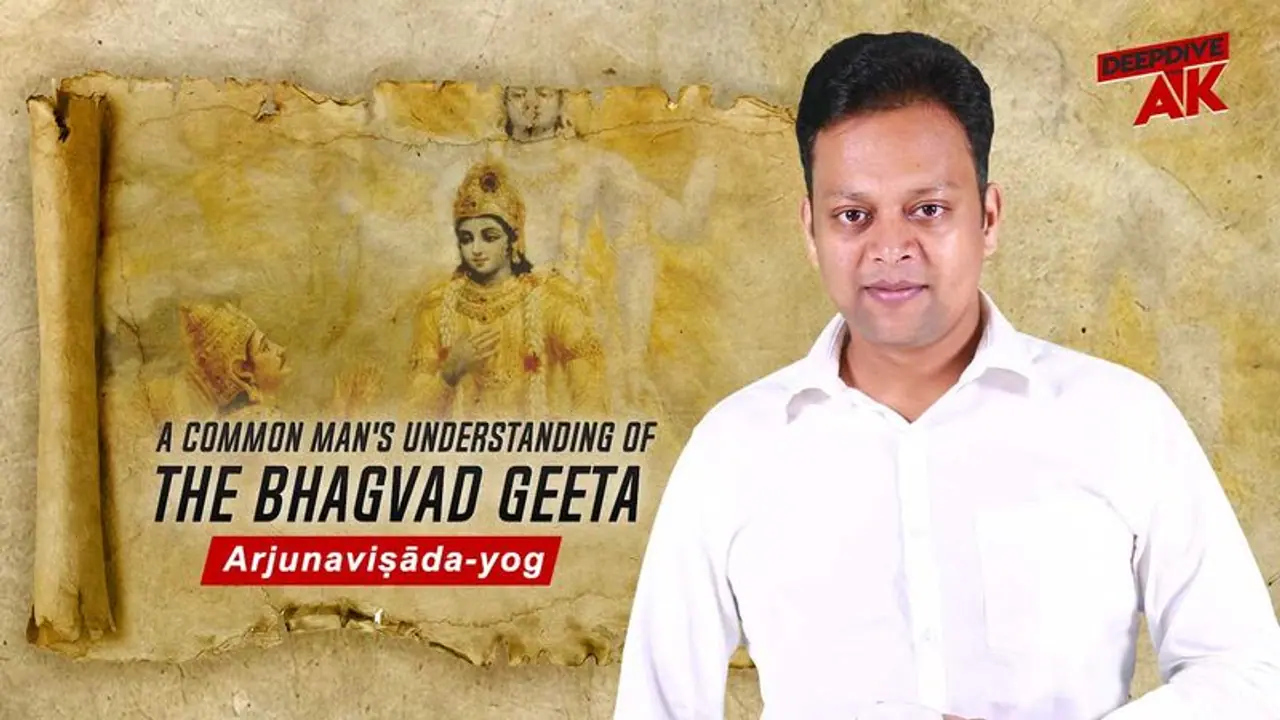Abhinav Khare deep dives into the inability of humans to deal with conflict and its explanation that can be found when one reads into the story of Arjun’s struggle in the initial verses of the Bhagvad Geeta
The problem of Sansar as defined by the Geeta is the problem of attachment, grief and delusion. Only when a person is not happy with oneself, one seeks external help.
If we go textually, the first 20 verses give a description of the battlefield and the commanders and leads up to Bhishma, Arjun and Krishna blowing their conches to start the battle. In verses 21 to 25, Arjun asks Krishna to place his chariot in the middle of the army so that he can monitor the army. Krishna drives his chariot and places it in front of Bhishma and Dronacharya and asks Arjun to now monitor his army.

It was at this moment that Arjun forgets his purpose and envisions his relatives again. He forgets his dharma. This is when Arjun feels attachment, delusion and grief. He ends up losing his cognitive power and even quotes scriptures to justify his delusion. This chapter ends when Arjun fails to understand how he can solve his problems. On one hand he wants to stop the war but isn’t convinced, on the other hand he doesn’t want to seek help from Krishna as well.
Thus, the message from the first chapter of Gita is that the reason there is sorrow and sufferings in this world is the inability of humans to deal with conflict. If we realise the conflict and attempt to solve it, we can progress in our personal, professional and spiritual journeys.
एतान्न हन्तुमिच्छामि घ्नतोऽपि मधुसूदन |
अपि त्रैलोक्यराज्यस्य हेतो: किं नु महीकृते || - Shlok 35
Oh Krishna (Madhusudan)! Even if they want to kill me in all the three worlds, I do not intend to kill them in any! So, the question of killing them on Earth or the world doesn’t arise, does it?
If we delve in deeper, conflict can be of three types: physical, mental and spiritual. Physical conflicts exist everywhere. Animals fight to protect their territories. Even inanimate objects collide against each other. We humans also quarrel and fight with others. It is said that even our minds are always in conflict. The fight is between rationality and ego. Arjun was a warrior who took to the battlefield to fight evil but the moment he saw his family and teacher; his primal behaviour took over.
Our mental conflicts aren’t one we can escape from. They exist always and forever: nothing new. Thus, when Krishna took Arjun in between the two armies, the question of identity arose. Arjun questioned himself on which side he should be. Thus the mental conflict merged with the spiritual. Arjun tries to justify these conflicts using logic, god and rationalisation. Something we all do to escape from the tough truth of life. We never really know who we are and thus are always at crossroads not knowing which way to go.
Unless we know who we are, we can never decide what God is or what our relationship with God is. If we remain unaware of this, we shall never be able to resolve any of our conflicts, may it be physical, emotional or spiritual. This is the central theme of the first chapter of Bhagvad Geeta.
About Abhinav Khare:
Abhinav Khare is the CEO of AsiaNetNews Network and also the host of a daily show named Deep Dive with AK. AsiaNetNews is a leading media group of south India with highly valuable brands like AsiaNetNews, Suvarna News, Kannada Prabha, IndigoMusic, Indigo Radio, MyNation, NewsFast, IndigoXP Music lounges.
He is a proud father of two beautiful daughters and resides in Bengaluru with his loving family and a lifetime collection of books and gadgets. An avid traveller, he has already pinged more than hundred cities from 5 major continents around the globe.
A tech entrepreneur, who is passionate about policy, technology, economy and philosophy from ancient India. His favourite pastime is to research synergy between these facets of society. He earned his qualifications from the top 10 global universities; an MS Engineering from the ETH Zurich and an MBA Finance from the London Business School.
